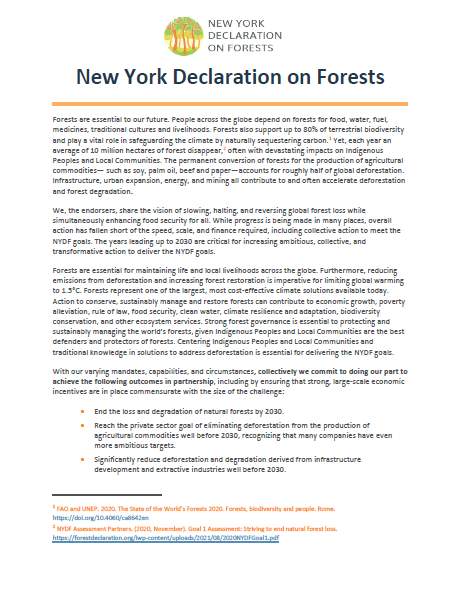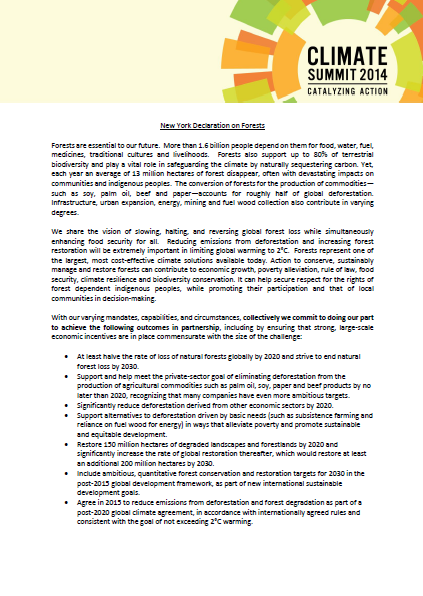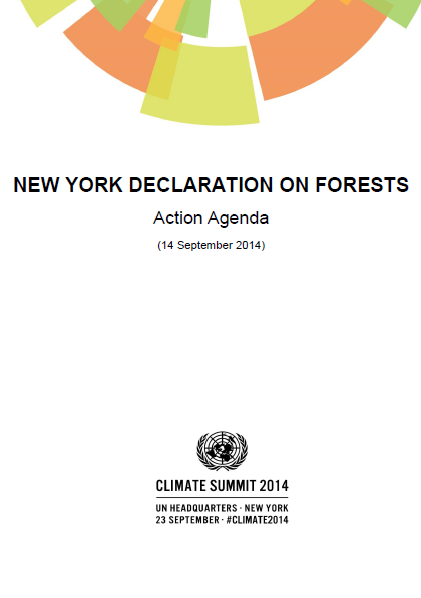The New York Declaration on Forests (NYDF) is a political declaration calling for global action to protect and restore forests. It offers a common, multi-stakeholder framework for forest action, consolidating various initiatives and objectives that drive forest protection, restoration, and sustainable use.
Adopted in 2014 and refreshed in 2021, the NYDF is the major reference point for global forest action. Its ten goals include halting natural forest loss by 2030, restoring 350 million hectares of degraded landscapes and forestlands, improving governance, increasing forest finance, and reducing emissions from deforestation and forest degradation as part of the Paris Agreement.

Forests are essential to our future. People across the globe depend on forests for food, water, fuel, medicines, traditional cultures and livelihoods. Forests also support up to 80% of terrestrial biodiversity and play a vital role in safeguarding the climate by naturally sequestering carbon.Yet, each year an average of 10 million hectares of forest disappear, often with devastating impacts on Indigenous Peoples and Local Communities. The permanent conversion of forests for the production of agricultural commodities— such as soy, palm oil, beef and paper—accounts for roughly half of global deforestation. Infrastructure, urban expansion, energy, and mining all contribute to and often accelerate deforestation and forest degradation.
We, the endorsers, share the vision of slowing, halting, and reversing global forest loss while simultaneously enhancing food security for all. While progress is being made in many places, overall action has fallen short of the speed, scale, and finance required, including collective action to meet the NYDF goals. The years leading up to 2030 are critical for increasing ambitious, collective, and transformative action to deliver the NYDF goals.
Forests are essential for maintaining life and local livelihoods across the globe. Furthermore, reducing emissions from deforestation and increasing forest restoration is imperative for limiting global warming to 1.5°C. Forests represent one of the largest, most cost-effective climate solutions available today. Action to conserve, sustainably manage and restore forests can contribute to economic growth, poverty alleviation, rule of law, food security, clean water, climate resilience and adaptation, biodiversity conservation, and other ecosystem services. Strong forest governance is essential to protecting and sustainably managing the world’s forests, given Indigenous Peoples and Local Communities are the best defenders and protectors of forests. Centering Indigenous Peoples and Local Communities and traditional knowledge in solutions to address deforestation is essential for delivering the NYDF goals.
With our varying mandates, capabilities, and circumstances, collectively we commit to doing our part to achieve the following outcomes in partnership, including by ensuring that strong, large-scale economic incentives are in place commensurate with the size of the challenge:
Achieving these outcomes could achieve over 7 billion tons (CO2e) of cost-effective climate change mitigation per year by 2030. By working in partnership, we can achieve these collective goals and chart a new course toward conserving, restoring, and managing healthy forests for the benefit of all. We invite others to join us in committing to a world where people and forests grow together.








